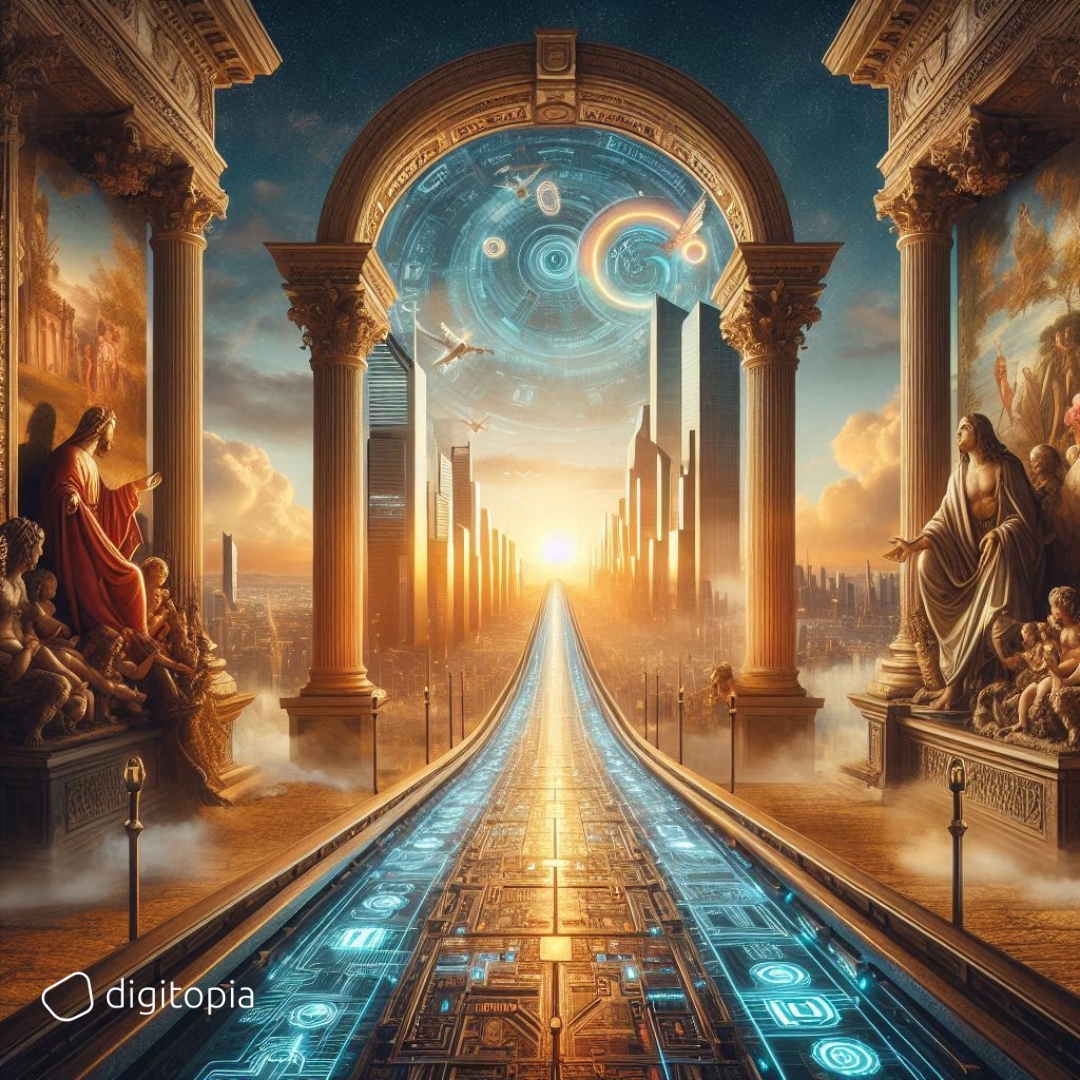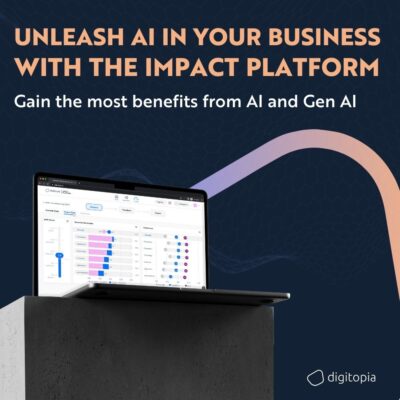
In today’s world, the most transformative force since the internet is here, promising not just an upgrade but an overhaul of everything we know—AI. This isn’t the first time humanity has faced an era of sweeping change, yet each wave, from the industrial revolution to the dawn of computing and the digital age, has brought unique challenges and unprecedented opportunities. With AI, we’re now at a new frontier, requiring companies not merely to adapt but to redefine, rebuild, and, if necessary, revolutionize.
The Renaissance and Enlightenment: A Model for Business Transformation
The Renaissance and Enlightenment eras were more than cultural awakenings; they were profound transformations across every dimension of society—art, science, philosophy, and commerce. The Renaissance sparked a reimagining of what was possible, with visionaries like Leonardo da Vinci and Galileo challenging conventions and unleashing unprecedented creativity and discovery. The Enlightenment that followed brought a spirit of reason and inquiry, pushing humanity toward scientific breakthroughs, new economic models, and profound social change.
For today’s business leaders, the spirit of these eras holds a powerful message: transformation is not only inevitable but essential. Much like the printing press accelerated knowledge and reshaped economies, AI now drives change at an unprecedented pace. Every legacy system, outdated process, or stagnant culture risks becoming a barrier in this new era. As with Renaissance patrons who fueled the progress of the great thinkers, executives today must invest in the technologies and cultures that will enable their organizations to thrive.
In this Age of AI, a “Renaissance mindset” isn’t just an advantage—it’s a necessity. Companies willing to question, reinvent, and embrace continuous renewal across all dimensions will not only lead but define the future. Those who resist, however, risk obsolescence.
Now is the time for a business renaissance—one that is measured, purposeful, and transformative.
Legacy Transformations Throughout History: Learning from Past Waves of Change
Understanding why today’s change is essential means appreciating previous waves of transformation that have redefined what it means to do business.
- The Industrial Revolution: The transition from manual labor to mechanized manufacturing drastically changed production scales and efficiency. Those who resisted change became obsolete, while early adopters set new standards and enjoyed long-term success.
- The Advent of Computers: In the mid-20th century, computers transformed data processing, launching businesses into new realms of efficiency. Companies that digitized processes and introduced computing power reaped tremendous productivity gains.
- The Dot-Com and E-Business Revolution: The internet redefined communication, commerce, and connection. Companies had to rethink customer interactions, adopt digital-first business models, and often rebuild from the ground up. Those who embraced the internet became the household names we know today.
- The Age of AI: Now, we’re amid a shift unlike any other. AI is not just a tool; it’s an augmentation of our capabilities, bringing new ways to analyze data, interact with customers, and automate processes. The businesses that fail to leverage AI risk not only competitive disadvantage but irrelevance.
With each wave, companies have had to rethink and rebuild. This time is no different. In the Age of AI, everything—processes, systems, people, culture, and management style—requires rethinking. This is where Digitopia comes in, helping organizations measure, transform, and thrive in this new era.
Why Modernization is Imperative in the Age of AI
AI is a powerful tool, but its potential is only realized when companies align it with a broader mission of modernization. Without it, businesses are left with outdated processes, systems, and cultures that slow down agility, inhibit growth, and compromise competitiveness.
- Accelerated Decision-Making: AI enables real-time insights and predictive analytics, transforming decision-making from reactive to proactive. Legacy systems can’t support the speed or volume of data needed to operate effectively in today’s market.
- Enhanced Efficiency and Productivity: AI-driven automation improves efficiency by reducing human error and eliminating manual tasks, allowing employees to focus on higher-value work. Sticking with legacy methods of operation holds back organizations from achieving their full potential.
- Data-Driven Operations: AI thrives on data, and without modern systems and processes to collect, analyze, and utilize this data, companies risk underutilizing their greatest asset. Companies must adopt modern data strategies if they are to remain competitive and data-literate.
- Customer-Centricity at Scale: AI allows businesses to anticipate customer needs, personalize interactions, and respond quickly. Without the ability to do this at scale, customer satisfaction and retention become increasingly challenging.
- Future-Proofing: Change is accelerating. Companies must be flexible enough to adapt to emerging trends, and this is nearly impossible when stuck with legacy systems, processes, and mindsets.
With these benefits in mind, let’s look at how a Renaissance mindset can help companies rethink, reimagine, and rebuild their way to sustained success in the Age of AI.
Maximize Your AI Potential with AIMI
To truly capitalize on the potential of AI in this new era, it’s essential to assess and enhance your organization’s AI readiness. Discover how our AI Maturity Index (AIMI) can guide your business through its AI transformation journey by providing a structured approach to evaluating and improving your AI capabilities.
Resistance to Change: Lessons from History
Throughout history, every wave of transformation has faced its share of resistance. In the early 19th century, the Luddites, skilled textile workers, famously protested the Industrial Revolution, destroying machinery they feared would replace their livelihoods. Similarly, during the rise of computers and the internet, countless voices doubted their potential, seeing them as passing fads or threats to traditional jobs.
Yet, each transformation continued to shape society, creating new industries, roles, and opportunities far beyond the scope of the initial resistance. Those who adapted reaped the benefits, while those who resisted often fell behind. The lesson is clear: change happens regardless of opposition, and those who embrace it early gain a critical advantage.
In today’s Age of AI, resistance may still linger, but transformation is inevitable. Just as with past revolutions, the organizations that adapt, innovate, and drive change will define the future, while those who resist risk obsolescence.
How to Begin Your Renaissance Journey
- Assess the Current State: Start by evaluating where your legacy systems, processes, and cultures are holding you back. Digitopia’s Impact Platform enables companies to measure their current maturity and identify areas of potential transformation.
- Build a Roadmap for Modernization: Use the assessment to create a step-by-step modernization plan. Prioritize quick wins that can build momentum, and identify longer-term transformation goals.
- Embrace a Renaissance Mindset: Foster a culture of learning, experimentation, and adaptability. Inspire curiosity and encourage employees to question existing methods.
- Make it Measurable: Ensure that each step of your modernization journey is measurable. By setting KPIs, tracking progress, and assessing impact, you’re able to pivot when necessary and demonstrate progress. Remember, “what’s measured gets done.”
- Partner with Transformation Experts: Modernization is complex and may benefit from experienced partners. Transformation platforms like Digitopia’s provide a structured approach, supporting every step to #transformbetter.
Deepen Your Understanding with Our eBook
Learn how to transform your legacy systems with AI through our comprehensive eBook. It offers practical insights and strategies to modernize your technology infrastructure for success in the Age of AI.
It’s Time for a Renaissance in Business
The Age of AI isn’t just another phase; it’s a catalyst for radical, foundational change. By embracing this Renaissance mindset, business leaders can not only future-proof their organizations but also create thriving, resilient, and data-driven enterprises. The path may be challenging, but with the right strategies, tools, and mindset, success is within reach.
As we embark on this journey together, remember: transformation is not just about technology; it’s about reimagining the future of work, culture, and value creation. Digitopia is here to ensure your transformation journey is structured, measurable, and effective because, in the end, what’s measured truly gets done. #transformbetter





